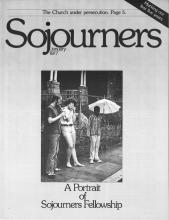The grim atrocities of repressive regimes have been increasingly inflicted on Christ’s body during the past months. Many Christians have of late been arrested, jailed, exiled, even martyred for acting as faithful disciples of Christ.
Consider this litany of recent incidents:
•The Philippines
Two Catholic priests have been deported, several hundred lay leaders have been arrested, and two Catholic radio stations and magazines have been suppressed in this country, which is 84% Catholic.
Father Edward Gerlock of Binghamton, N.Y., was one of the deported priests. He had been a missionary in the Philippines for 14 years, spending most of his time with the poor farmers of Mindanao and, more recently, in the slums of Manila. When he protested continued martial law in the Philippines and persecution in Korea, the Maryknoll priest was suddenly arrested and deported last November, “for having shown undue interest in the political process and affairs of the country.” Father Albert Booms of Harbor Beach, Michigan and Maryknoll Sister Jean O’Brien were also forced to leave.
In the area of Mindanao, the scene of rebel activity against the Marcos government, several hundred lay leaders have been charged with “subversive activity.” Most of them are principals and teachers in Catholic schools, parish team coordinators, announcers for Catholic radio stations, and other Church officials.
The two radio stations, one operated by the Jesuits and the other by Maryknoll, were seized by Marcos’ police in late November. Both stations had been critical of the regime. Two Catholic magazines, The Communicator, and Signs of the Times, were shut down in early December after featuring articles critical of social conditions and martial law.
All this is part of what the Marcos government and its controlled press describe as a crackdown against the “Christian Left.”
Read the Full Article

